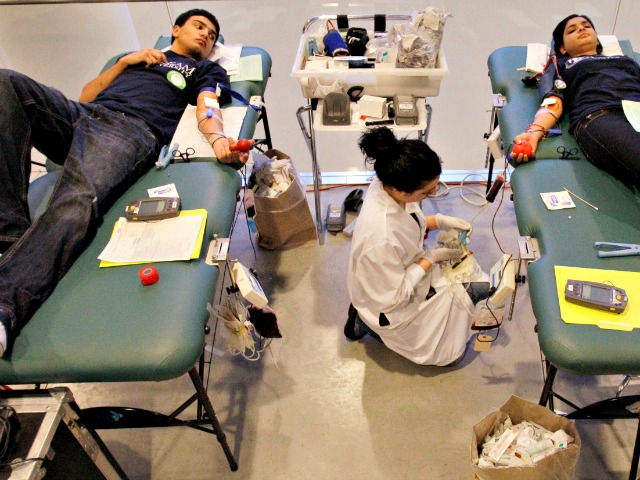In 1983, as the AIDS epidemic was raging, gays and bisexual men were banned from donating blood by the FDA. Now San Francisco Supervisor Scott Wiener has introduced a resolution to end the ban, and the city board is expected to approve it.
Weiner told KTVU in San Francisco that the city has to make a statement to the FDA that times and technology are changing. He charged, “It’s discriminatory, it has no basis in public health. All donated blood is heavily tested, and it’s depriving our country of a lot of blood that could be donated to help save peoples’ lives.”
A lesbian who has been donating blood for thirty years snapped to KTVU, “I think it’s time for the government to take its regulatory self and shove it, to tell you the truth. If the blood is clean, we need it. Use it.”
Wiener, who is openly gay, acknowledged in 2011 that HIV/AIDS was still a major problem in San Francisco, saying, “We have a large and aging population of people living with HIV/AIDS. Until we minimize or eliminate new infections, we must focus on prevention. We can’t keep letting our community, and particularly our young people, become positive. In addition, after 30 years of the epidemic, we have a large population of HIV-positive people in our community.”
The FDA reported in August 2013;
A history of male-to-male sex is associated with an increased risk for exposure to and transmission of certain infectious diseases, including HIV, the virus that causes AIDS. Men who have had sex with other men represent approximately 2% of the U.S. population, yet are the population most severely affected by HIV. In 2010, MSM accounted for at least 61% of all new HIV infections in the U.S. and an estimated 77% of diagnosed HIV infections among males were attributed to male-to-male sexual contact. Between 2008 and 2010, the estimated overall incidence of HIV was stable in the U.S. However the incidence in MSM increased 12%, while it decreased in other populations. The largest increase was a 22% increase in MSM aged 13 to 24 years. Since younger individuals are more likely to donate blood, the implications of this increase in incidence need to be further evaluated. FDA’s deferral policy is based on the documented increased risk of certain transfusion transmissible infections, such as HIV, associated with male-to-male sex and is not based on any judgment concerning the donor’s sexual orientation.
The Blood Centers of the Pacific asserted that using gay blood donations could help shore up its dwindling supply of blood type O donations. William Hackley of the organization said, “There are hundreds, if not thousands of people who are willing to donate, who are healthy, but right now, can’t.”

COMMENTS
Please let us know if you're having issues with commenting.